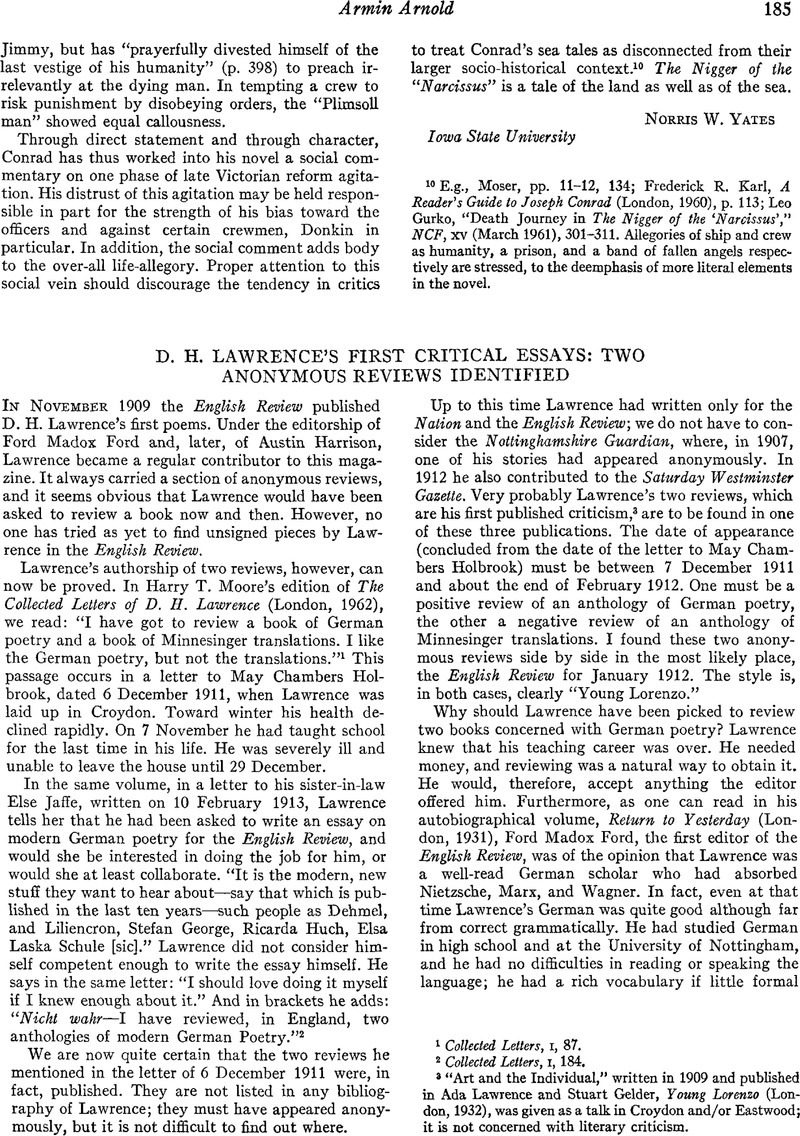No CrossRef data available.
Article contents
D. H. Lawrence's First Critical Essays: Two Anonymous Reviews Identified
Published online by Cambridge University Press: 02 December 2020
Abstract

- Type
- Notes, Documents, And Critical Comment
- Information
- Copyright
- Copyright © Modern Language Association of America, 1964
References
1 Collected Letters, i, 87.
2 Collected Letters, i, 184.
3 “Art and the Individual,” written in 1909 and published in Ada Lawrence and Stuart Gelder, Young Lorenzo (London, 1932), was given as a talk in Croydon and/or Eastwood; it is not concerned with literary criticism.
4 These letters were published in their original German in Neue Rundschau (December 1934) and in Frieda Lawrence: Nur der Wind . . . (Berlin, 1936).
5 Collected Letters, i, 181.
6 See A. Arnold, “D. H. Lawrence and Thomas Mann,” CL, xiii (1961), 33–38.
7 Collected Letters, i, 107.
8 The review of The Oxford Book of German Verse—From the 12th to the 20th Century, ed. by H. G. Fiedler, with a preface by Gerhart Hauptmann (Oxford: The Clarendon Press, 1911) appears in English Review, x (January 1912), 373–374.
9 Paulus Gerhardt: “Zur Sommerzeit,” p. 30, in the book under review.
10 In his “Notes” Fiedler points out the poems which were set to music. He includes an alphabetical list of composers.
11 Lawrence took many points in this review from Contemporary German Poetry, sel. and transl. by Jethro Bithell (London, 1909). This is one of the points which Bithell makes in his introduction.
12 Almost literally from Bithell.
13 Eight pages, to be exact.
14 Liliencron has eleven pages.
15 Another point from Bithell. Lawrence may also have read K. C. K. Ensor's essay on Liliencron in Contemporary Review (October 1909). The dislike of “the modern artist's hyper-sensitive self-consciousness” is typical of Lawrence.
16 This poem is on page 481 of the book under review. The interpunctuation in the English Review is slightly different from the one in Fiedler's anthology.
17 Lawrence had read these poems in Bithell. Bithell's book is dedicated to Dehmel, and Bithell had included more poems from Dehmel than from any other writer. Hence Lawrence's remarks.
18 P. 517 of the book under review.
19 Lawrence had read poems by Geiger, Baum, and Lasker-Schüler in Bithell. Bithell's volume is, according to B. Q. Morgan, Critical Bibliography of German Literature in English Translation 1481–1927 (Stanford University Press, 1938), the only book published in England which contained, at that time, poems by any of these three writers. In spelling Else Lasker-Schiiler's name, Lawrence commits here two of the same mistakes as in the letter to his sister-in-law (Collected Letters, i, 184); another proof of Lawrence's authorship.
20 The review of Jethro Bithell's The Minnesingers (London: Longmans Green, 1909) appears in English Review, x (January 1912), 374–376.
21 The second volume never appeared.
22 Lawrence's quotations from Bithell are inexact, although he does not change Bithell's meaning.
23 Lawrence took the original version from Fiedler's anthology. It appears there on p. 533. Fiedler also has a translation into modern German on p. 1.
24 Bithell really has: “Mine art thou ...”
25 This is on p. 68 in Bithell's Minnesinger book. Lawrence found the original in Fiedler, p. 534, and a modern German translation in the same book, p. 3.




